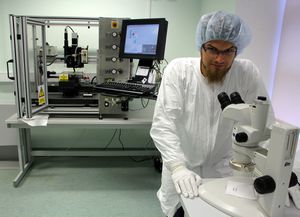Theses in Materials
Microfabrication
Micro-printing
Miniaturization of technology requires materials with specific properties and use of accurate fabrication methods to sustain the performance of devices despite being smaller in size. One of our research directions is inkjet-printing of functional materials, for example carbon electrodes for three-dimensional micro-batteries and printed soft micro-actuators.
Controlled synthesis of micro-carbon
In order to use ink-jet printing for carbon electrode fabrication, the size of carbon powder particles has to be in the range of 5 µm not clog the nozzles of the dispensing devices. In commercial carbon inks, carbon soot is used which contains nanosized particles, but carbon powder consisting of micrometre-sized particles can provide additional possibilities to functionalize inks and tune the properties of the resulting electrode via tuning the porosity of carbon microspheres. One possibility for controlled synthesis of micro-carbon is spray pyrolysis. The goal is to study spray pyrolysis for synthesis of carbon powder and investigate how morphology and size of particles can be controlled by varying the preparative conditions.
Carbon electrodes for battery via spin-coating
Spin-coating is a technique for preparing thin films. The aim of the project is to fabricate carbon electrodes by spin-coating and investigate their properties as a battery electrode. Carbon under investigation is a specific sol-gel derived carbon which properties are determined by synthesis conditions and in turn are manifested in electrode properties.
Check out also student projects on ionic liquids and soft robotics materials.
